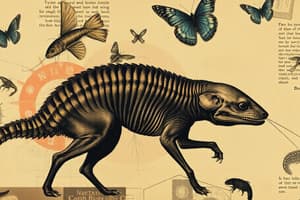Podcast
Questions and Answers
Which type of transmission involves the infective stage of the parasite developing within the body of an arthropod?
Which type of transmission involves the infective stage of the parasite developing within the body of an arthropod?
- Mechanical Injury
- Inoculative Transmission (correct)
- Chemical Injury
- Active Transmission
Which phylum of veterinary importance is characterized by a cylindrical body, thick cuticle, and a retractile proboscis with spines?
Which phylum of veterinary importance is characterized by a cylindrical body, thick cuticle, and a retractile proboscis with spines?
- Platyhelminthes
- Acanthocephala (correct)
- Nemathelminthes
- Annelida
Which class of Platyhelminthes is characterized by a single body and a present alimentary canal?
Which class of Platyhelminthes is characterized by a single body and a present alimentary canal?
- Trematoda (correct)
- Nematoda
- Turbellaria
- Cestoda
What is the key characteristic that differentiates Nematoda from Platyhelminthes?
What is the key characteristic that differentiates Nematoda from Platyhelminthes?
Which phase of Fasciolopsis infection is characterized by anemia, hypoalbuminemia, and weight loss?
Which phase of Fasciolopsis infection is characterized by anemia, hypoalbuminemia, and weight loss?
Which class of Platyhelminthes is characterized by a segmented body, with the body divided into proglottids?
Which class of Platyhelminthes is characterized by a segmented body, with the body divided into proglottids?
What is the term used for animals that harbor the adult, reproducing stage of a parasite?
What is the term used for animals that harbor the adult, reproducing stage of a parasite?
Which term describes a host that carries part of the immature parasite stage but does not allow development?
Which term describes a host that carries part of the immature parasite stage but does not allow development?
What is the period between the entry of the infective parasite stage and the appearance of adult parasites called?
What is the period between the entry of the infective parasite stage and the appearance of adult parasites called?
Which term describes parasites that occasionally appear in an unusual host?
Which term describes parasites that occasionally appear in an unusual host?
What is the term for parasites that wander into abnormal locations within their normal host?
What is the term for parasites that wander into abnormal locations within their normal host?
Which transmission mode occurs through environmental contamination?
Which transmission mode occurs through environmental contamination?
Flashcards are hidden until you start studying
Study Notes
Types of Transmission
- Active Transmission: occurs through penetration
- Inoculative Transmission: occurs when infective stage of the parasite has developed in the body of an arthropod
- Passive Transmission: occurs through contaminations
Effects of Parasite on Individual Host
- Injurious/Defensive: wide range of severity, leading to manifested disease often resulting to death
- Mechanical Injury: involves destructive action such as perforation of an organ, destruction of cells, piercing tissues, obstruction of a lumen
- Chemical Injury: results from secretions by the parasites, introducing pathogenic organisms such as bacteria
Phylum Platyhelminthes (Flatworms)
- Characteristics: soft-bodied, flatworms, incomplete digestive tract in trematodes, none at all in cestodes
- Reproduction: usually hermaphroditic, bisexual, with male and female reproductive organs present in one individual
- Organs: embedded in tissues called parenchyma
- Excretory organs: called flame cells or solenocytes
Classes of Platyhelminthes
- Turbellaria (Eddy Worms, Planarians): non-parasitic, living in fresh water
- Trematoda (Flukes): monozoic, single body, alimentary canal is present, parasitic
- Cestoda (Tapeworms): polyzoic, segmented body, alimentary canal is absent, parasitic
Phylum Nemathelminthes (Roundworms)
- Characteristics: sexes are separate, alimentary canal is present, perienteric space is present, parenchyma is absent
- Excretory organs: consisting of lateral canals along the body wall, flame cells are absent
- Life cycle: may be direct or indirect
Phylum Acanthocephala (Thorny Headed Worms)
- Characteristics: cylindrical, thick cuticula, retractile proboscis with spines
- Life cycle: indirect
- Reproduction: separate sexes, parasitic
Trematodes (Liver Flukes)
- Fasciolopsis: acute or chronic disease
- Acute disease: associated with large number of migrating larvae, resulting in sudden death due to acute and massive hemorrhage
- Chronic disease: characterized by anemia, hypoalbuminaemia, weight loss, begins when immature larvae reach the bile ducts, mature into adult flukes, and start producing eggs
Helminthology Terminologies
- Monoecious (Hermaphrodite): male and female sexual organs in one individual
- Dioecious: male and female sexual organs are in separate individuals
- Host: animal which is parasitized
- Final or Definitive Host: animal in which the reproducing stage (adult) of the parasite occurs
- Primary or Prime Host: animal in which parasite is commonly found and development occurs
- Transport Host: carries part of the immature stage of the parasite but no development occurs
- Paratenic Host: harbors a larval stage of the parasite but cannot get rid of it, and further development of the parasite depends upon ingestion of the paratenic host by the final host
- Reservoir Host: an animal from which infection may be passed to other species, in veterinary usually from wild to domesticated stock
- Intermediate Host: one in which part of the immature phase of the life cycle is spent and development occurs
- Prepatent Period: the time which elapses between the entry of the infective stage up to the demonstration of adult parasites within the host
- Erratic/Aberrant Parasite: wander into unusual places in the normal host
- Incidental Parasite: those which occasionally appear in unusual host
Studying That Suits You
Use AI to generate personalized quizzes and flashcards to suit your learning preferences.




